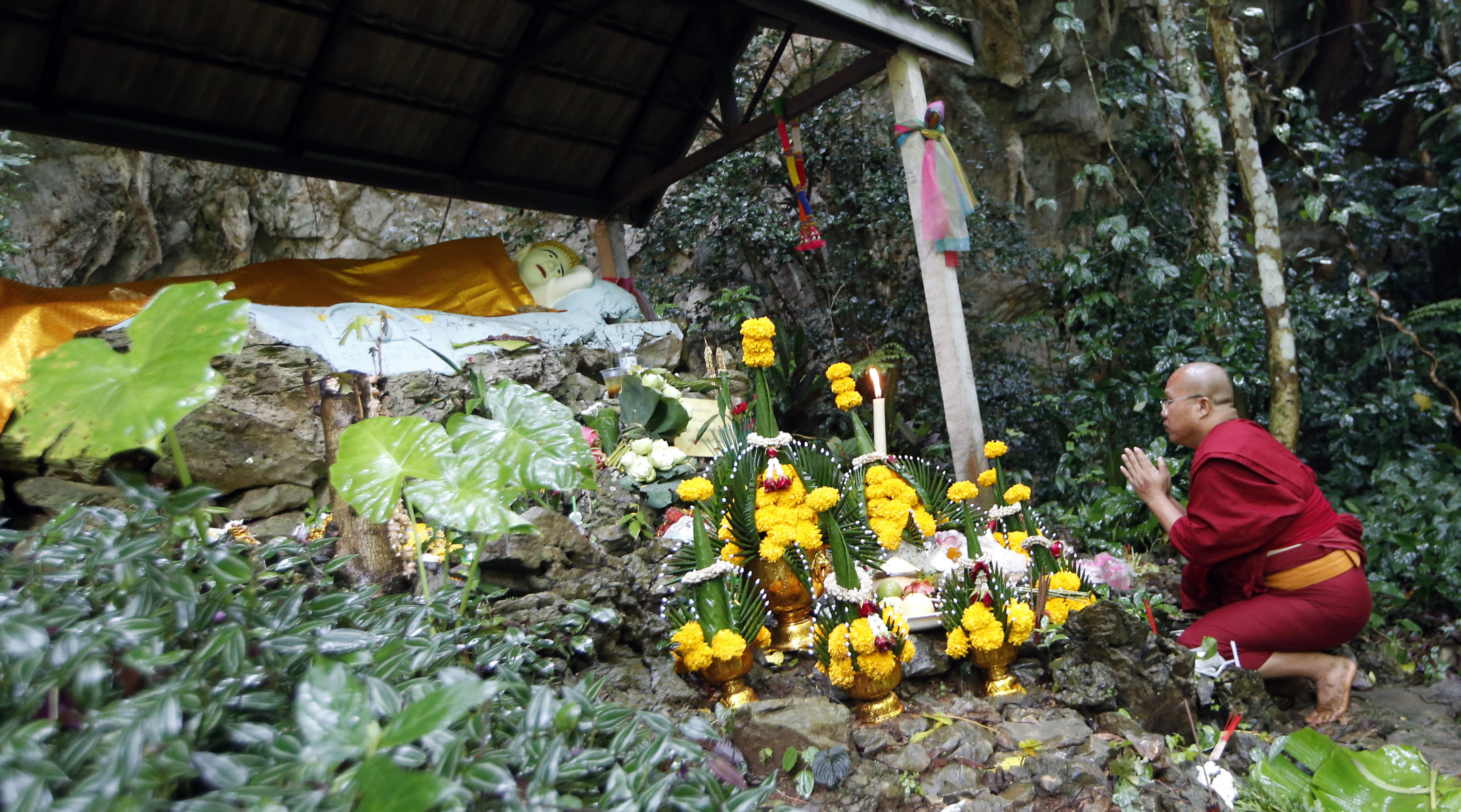Spirit of mythical princess looms over Thai cave crisis

A Thai Buddhist monk pray for 12 boys and their soccer coach, in Mae Sai, Chiang Rai province, northern Thailand Wednesday, June 27, 2018. Rain continued to fall and water levels kept rising Wednesday inside a cave in northern Thailand, frustrating the search for the boys and the coach who have been missing in the sprawling underground caverns since Saturday. (AP Photo/Sakchai Lalit)
MAE SAI, Thailand — Along a muddy mountain path not far from the entrance to a flooded cave where 12 young members of a Thai soccer team have been missing for four days is a shrine to a mythical princess whose spirit is said to inhabit the caverns below.
A steady stream of visitors come to kneel down, light candles and incense and pray in front of a statue of a young woman wearing a pink traditional outfit, surrounded by flowers and other offerings.
For days, the wish has been a simple one: Please let our boys come home.
The youngsters aged 11-16 have been missing since their 25-year-old coach took them to the sprawling cave on Saturday after a practice match. Rescuers led by elite navy divers have been frustrated by incessant rain and flooding that has slowed their search of the kilometers-long (miles-long) underground complex.
The statute is of Jao Mae Nang Non — which roughly translates as the reclining goddess — and her name is shared with the cave, Tham Luang Nang Non, as well as the surrounding mountain, Doi Nang Non.
Article continues after this advertisementHer legend, and in turn how her spirit came to linger in the cave in Chiang Rai province’s far northern Mae Sai district near Myanmar, is similar to dozens of other tales across a country whose belief system and folklore are heavily influenced by Brahmin, Buddhist and animist traditions.
Article continues after this advertisementIt also speaks to the spiritual and mythical significance that caves hold in the Southeast Asian nation, where the ordeal of the young soccer players has spawned an outpouring of media coverage of ghost stories and supernatural explanations for the incident.
The legend goes that in ancient times a beautiful princess fell in love with a stable boy and became pregnant. Knowing their love was forbidden, they fled and eventually settled in the cave to rest. When the stable boy went out in search of food, he was caught by the princess’ father’s army and killed.
Distraught, the princess stabbed herself and bled to death in the cave.
The legend says it is her blood that became the water that flows through the cave, while her body is the surrounding mountains, said to look like a sleeping woman.
Runchanok Nganjit, a student and native of Mae Sai, said she has heard the story of the princess since she was a child and that local residents believe her spirit now guards the cave.
“We all believe that all places have guardian spirits, places like mountains, caves and houses,” she said. “We may not see them, but they can see us so we need to respect them when we go into their places.”
She said she believes the princess’ spirit is playing a role in the disappearance of the boys but she isn’t sure how.
Caves throughout Thailand have shrines, many of them Buddhist, and often bear stories about the Buddha’s travels in the region and how he pacified fearsome giants or spirits, said Andrew Alan Johnson, an anthropology professor at Princeton University and author of “Ghosts of the New City,” about development and tradition in northern Thailand.
In the myths of the northern region, there is a link between danger and caves and the idea that these dangerous female spirits, or Jao Mae, can also help humans who can appeal to them, he said.
“The Jao Mae of caves seem to suggest something constant about caves in the human imagination,” he said. “Here are spirits who stand at the bridge between life and death — indeed, if we think of women as those figures that are able to bring life into the world, it’s unsurprising that these spirits are for the most part female — dwelling in these liminal spaces. They are places of danger, but also of possibility.”
Edoardo Siani, a cultural anthropologist at Kyoto University who specializes in Buddhism and power in contemporary Thai society, said caves in Thailand are thought to hold a special kind of power that those who enter can accumulate.
He said this is why ascetic religious practitioners like monks and hermits sometimes go to meditate in caves. It’s also the genesis for the shrines and offerings.
“The reason why you find offerings and even shrines built inside caves throughout Thailand is that people try to appease the spirits or the gods that may inhabit the caves, and who have already domesticated that power,” he said.
As for the tale of the reclining goddess, “because she has killed herself in it, she has indeed become part of that otherworld, and, very much like the cave itself, she has become simultaneously attractive and scary,” he said.
On Wednesday afternoon, as the rain poured around them, Naruemon Saowake and her friends made their way to the Jao Mae Nang Non shrine with an offering that included soda, boiled eggs, fruit and desserts.
“I don’t know what upset her. But we will make an offering to please her,” she said. “I hope she will be kind and let the boys come home.” /muf